Required Core Data Files Overview
This article will serve to provide a general overview of the Required Core Data files and their impact in the Outcomes product for non-technical users. This is not meant to be guide for Data Managers in the construction of files. Please see our Technical Resources for further help and guidance. The Outcomes platform can use several optional Core Data File imports that can enhance the user experience and enable several additional features. These import files are not required for the Outcomes platform. The optional files are:
Accounts
Organizational Units
Academic Term
If you are using, or will be using the Anthology Evaluate, contact Anthology Support to discuss your Core Data files as your choices will affect both products.
Accounts File
The Accounts File import is the most basic information that the platform requires to identify a user and tie information to them. In Outcomes, users will need to be in the Accounts file to gain access to the platform. Faculty, staff and administrators can then be assigned permissions in Outcomes to gain access to different reports and responsibilities in the platform. The Accounts File is also required by Anthology Planning and Evaluate.
Core Data File View

Platform View
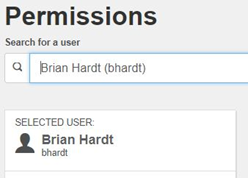 |
The user is now available to select and assign permission in the Permissions Settings area of Outcomes.
Organizational Units File
The Organizational Units File import, sometime referred to as the Organizational Chart, is used to create the structure of your institution in the Outcomes platform. These organizational units, possibly along with Courses and Sections, establish all the possible data collection and reporting options in Outcomes. The Organizational Units File creates an organizational hierarchy through which data will be aggregated to produce different reports. Organizational units need to be set up properly to allow data to flow where it needs to go and meet your reporting needs. Please discuss your Organizational Chart with Anthology Support.
Once imported, you cannot delete organizational units, but you can make changes or additions to your organizational chart, although it is important to try and get the Organizational Chart as correct as possible before importing. The Organizational Units File is also required by Anthology Evaluate. If you are, or will be using both products, please contact your Consultant or Anthology Support to discuss the best to develop the file to meet the needs of multiple platforms.
Core Data File View
 |
Platform View
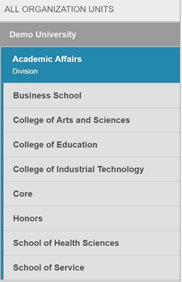 |
The Organizational Chart above shows the navigational representation of the Organizational Units File.
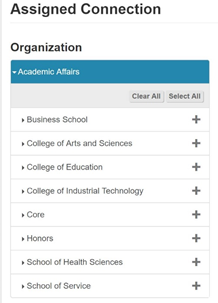 |
The Organizational Units also appear as options to create Connections to. They can now be used to develop the data aggregation and reporting functions. Please reach out to your Consultant or Anthology Support to develop an Organizational Chart that will meet your reporting needs.
Academic Terms File
The Academic Terms File import is used to create the structure of a campuses annual schedule within the Outcomes platform. The Academic Team is the base unit in which organizational charts, courses, sections, connections, and learning outcomes are housed. The Academic Terms File is also required by Anthology Evaluate. If you are, or will be using both products, please contact your Consultant or Anthology Support to discuss the best to develop the file to meet the needs of multiple platforms.
Core Data File View
 |
Platform View
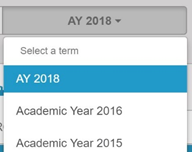 |
The academic year now appears as a navigational year in the Terms dropdown menu.
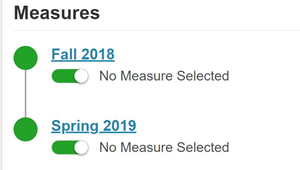 |
The semesters also appear as options in which to measure learning outcomes.